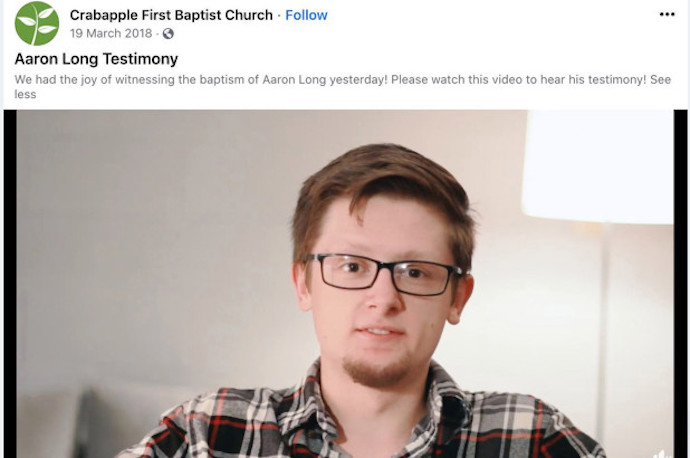Today, America is still reeling from the news of the mass murder of eight people at massage parlors in Georgia. Many are rightly calling the shooting spree an act of white supremacist terrorism, as the victims targeted were Asian women. The moment I read that the man who confessed to the murders was the son of a youth pastor who told police he had a “sex addiction,” however, it struck me that we must not ignore the specifically evangelical Protestant contours of this story.
I want to be clear. As Joshua Grubbs, an assistant professor of psychology at Bowling Green State University who has published research on religion and attitudes toward sex told RD, “Sex addiction is simply not a credible defense for mass murder.” One of the most significant conclusions Grubbs’ research points to, however, is that conservative Christian men are prone to believe that they have pornography or sex “addictions,” even when they do not. Before he was apprehended by police, Robert Aaron Long was reportedly on his way to target the porn industry in Florida for violence similar to what he perpetrated in Georgia.
According to Grubbs, “There’s a large and growing body of research that shows that conservative religious values are strongly linked to feelings of sex addiction. We find that men in particular are likely to interpret normal sexual urges as pathological and then act on them in ways that they find to be problematic.” As Grubbs told me in a previous interview, while some people do exhibit compulsive and dysregulated behavior with respect to pornography, “There are also quite a number of people who report feeling out of control even with minimal use.”
If Long is telling the truth about his desire to “eliminate” the “temptations”—that is, women—that he claims exacerbated his “sex addiction,” it’s likely that he learned to think of himself this way, and to objectify women, in church. In evangelical institutional environments such as churches and Christian schools, discussions of sex are usually steeped in purity culture, that is a complex of beliefs and practices associated with an unhealthy fear of sexuality and intense pressure to remain “pure”—that is, sexually inexperienced—before marriage. I am among the many ex-evangelicals who were essentially coerced into signing “purity pledges” in the 1990s, which is just one of the many manipulative practices associated with purity culture.
According to Grubbs, “Purity culture places heavy emphasis on temptation and evil. Pornography is considered evil and something to be eliminated. Given that framing, it’s not surprising that someone might view all sexual ‘temptations’ as evil and needing to be eliminated.” Speaking of Long, Grubbs elaborated, “I would not call this person a ‘victim’ of purity culture, but it is possible that he is a product of it.”
The flip side of more secular rape culture, purity culture teaches boys that they are “lust monsters” and girls that it’s their duty to protect their purity by being “modest.” In evangelical culture, youth pastors are among the primary purveyors of these messages, and thus key figures in socializing white evangelical youth in evangelicalism’s version of toxic masculinity. As a result, victims of child sex abuse and of sexual assault in evangelical communities are often blamed for “tempting” the perpetrators, while the latter, particularly if they’re white men with an important role in the church, are protected from what should be the full consequences of their crimes.
Generally these “addictions”—aren’t. On this see the work of @JoshuaGrubbsPhD
And yes, while this sometimes leads to self-hatred for boys and men, a lot of blame is placed on women and girls, whose “modesty” is policed and who are often blamed for their own molestation or rape.
— Chrissy Stroop (@C_Stroop) March 17, 2021
Evangelical purity culture is, of course, grounded in the specifically American inflection of white supremacism, with the sexualization of brown and especially Black bodies that goes along with a performative obsession to “protect” white women from Black men, who are assumed to be predatory. We can trace this racist trope back to European culture prior to the creation of the United States (think of the story of Othello, for example, of which Shakespeare’s version, adapted from sixteenth-century Italian material, appeared in 1603).
White supremacism and toxic masculinity are intertwined, historically and in the present, and both have their own inflections in evangelical subculture, where the fetishization of Asian women like those Long targeted is also common. Akiko Bergeron* knows this firsthand as an Asian-American woman who was active in Southern Baptist communities for decades, before evangelical Trump support led her to become an exvangelical.
Bergeron told RD, “White supremacy holds Asians in a weird light, complimenting them on being the ‘good minority,’ while also devaluing women into sex objects who exist for their pleasure.” Describing her own experience, she recalled, “As an adult in the SBC, I saw this fetish and devaluation from white men who thought I should have sex with them because as an Asian, I was a geisha (which they take to mean ‘sex worker’), and so it’s not really cheating or adultery for them.”
Bergeron’s experience with the few men of color in her SBC communities diverged sharply from her experience with white men, who “would confess their porn addictions to me, thinking I would fulfill their lust.” She says they were surprised when she showed that she took her own “purity” seriously, refusing these men by asking, “Do you believe it is appropriate to see women as sex objects?” By contrast, SBC men of color “saw me as a whole person and did not fetishize me for my race.”
America’s systemic white supremacy and patriarchy were both clearly factors in yesterday’s horrific violence. Both these phenomena exist outside of white evangelical and other conservative Christian spaces, of course, but at the same time, white evangelicals are demographic outliers in their use of “morality” to uphold and defend their far-right politics. Young white evangelical men who are active in their religious communities have perpetrated more than one act of terrorism in America’s recent past, and if we want to learn better how we might prevent such crimes, we must not be afraid of examining these connections.
*Last name changed to protect against possible professional retaliation.





